Thai youths to demand political reform in planned major demonstration
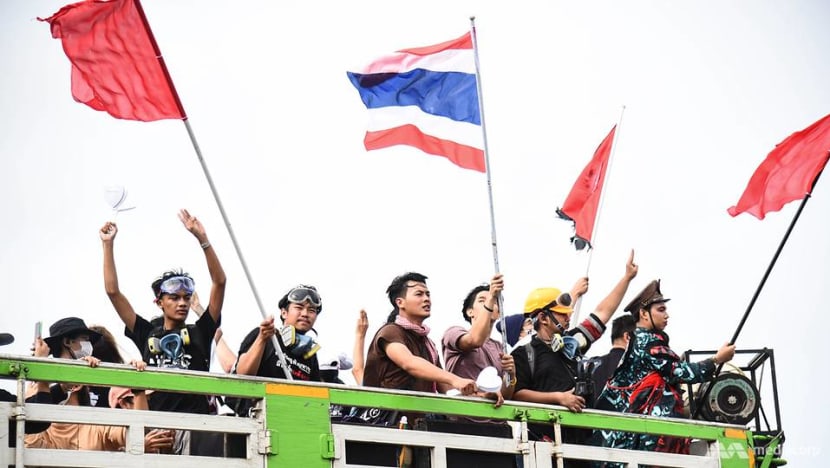
Tens of thousands of people joined a youth-led demonstration on 19 September, 2020. It is the biggest demonstration yet since a military coup in 2014. (Photo: Pichayada Promchertchoo)
BANGKOK: Thailand is set to witness another major demonstration starting on Wednesday (Oct 14), led by youths who are calling for political reforms.
The date of the planned demonstration is significant.
In the early hours of October 14, 1973, Thai security forces began a violent crackdown on students and pro-democracy demonstrators in Bangkok.
The civilians were demanding the release of 13 people previously detained over their call for a constitution after nearly 15 years of military dictatorship.
Tens of thousands of people had joined the demonstration for several days before the clampdown. More than 70 people were killed and more than 800 others hurt in the incident, which later brought an end to the authoritarian regime of Thanom Kittikachorn.
Ahead of the demonstration, here's a look at what the various stakeholders stand for:
THE DEMANDS
Led by youths, the rally on Wednesday could be a defining moment for Thai politics after a coup d’état in 2014 by Prayut Chan-ocha. The then army chief and current prime minister would control Thailand for five years, before am election in 2019 installed his political party to government.
Demonstrators have three demands: an end to his rule, reform of the monarchy and change to the current constitution, which was drafted and passed during the rule of Prayut’s military government.
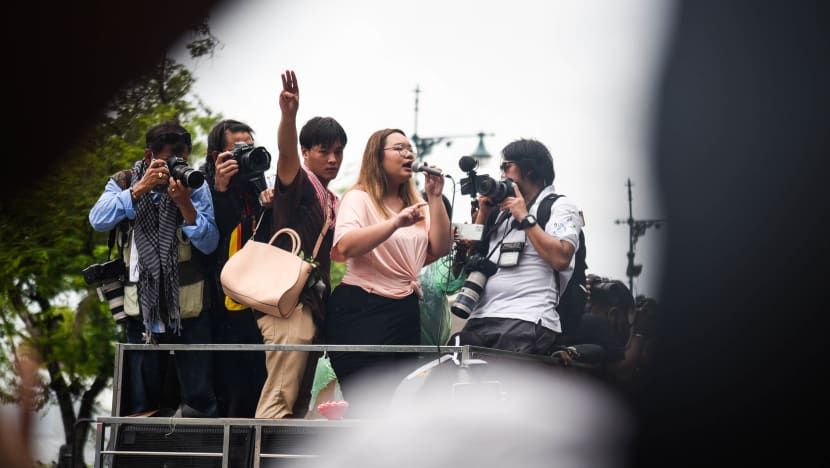
The demonstration on Wednesday was originally scheduled to begin at 2pm at the Democracy Monument on Ratchadamnoen Avenue in Bangkok.
But on Wednesday morning, anti-government protesters rescheduled their demonstration to 8am. They believe there are groups trying to take control of the area to obstruct their movement and decided to move in first. This came after the arrest of 21 protesters at Democracy Monument the day before when police used force to disperse the gathering.
It is driven by a coalition of youth groups from across the country, known collectively as the People’s Party. The name is a symbolic reference to a group of revolutionaries behind Thailand’s transition from absolute monarchy to constitutional monarchy in 1932.
“The demonstration on Oct 14 doesn’t belong to any particular group but to all the people,” Tattep Ruangprapaikitseree, member of the People’s Party and secretary-general of the Free Youth group, said in a press conference last week.
“We have so many problems. To solve them or change this country according to the three demands involves big restructuring. That’s why we need support from people of all groups, not only students but everyone of any age who agrees with us.”
READ: Spectre of university massacre looms over Thai student protests
THE TRIGGER
The demonstration by the People’s Party came after a parliamentary session on Sep 24, when lawmakers decided not to vote on six proposals for charter amendment submitted by the ruling coalition and opposition parties. Instead, a committee was formed to study the proposals for a month first.
The move was said to be the government’s attempt to delay changes to the constitution despite months of pressure from the public.
“They might have thought the voice that has been calling for charter amendment isn’t loud enough and made that decision, which is to buy time,” said Yingcheep Atchanont from legal monitoring group iLaw.
The group collected 100,732 names of people supporting its proposals for charter amendment, which were submitted to parliament on Sep 22. The proposals aim to give more power to the people to elect the prime minister and senators, while making it easier to amend the constitution.
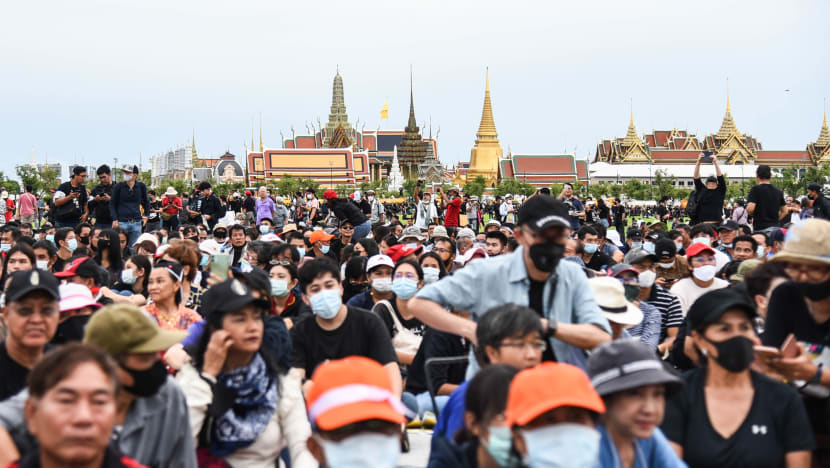
It is not known if the proposals will be considered in parliament anytime soon, or whether it will be supported. However, the setting up of a committee to study similar motions does not bode well from the perspective of the demonstrators.
Many see it is a signal that their push for constitutional amendment through parliament could be blocked, and that street politics is now the only option.
“We’ve been putting pressure on the parliament for more than two months. But all of a sudden, they closed the door on us. They force us to take to the streets,” Tattep told CNA.
Thailand’s current constitution of 2017 has been criticised as undemocratic. It empowers military-backed senators to jointly select the prime minister with the House of Representatives in the initial period.
The constitution also states that the premier does not have to be a member of parliament but one of the prime ministerial candidates listed by a political party. It also allows a process that could install an ‘outsider prime minister’ who need not be a listed candidate previously known to voters.
READ: Thai protest leaders, massacre survivors mark sombre anniversary
A SHIFT IN STRATEGY
In recent months, a number of youth groups have staged rallies against the government. Their gatherings were brief, peaceful and scattered across Thailand.
But on Wednesday, these factions are expected to be united under the umbrella of the People’s Party, as the movement shifts its strategy from short gatherings to a prolonged sit-in protest.
“We’ll definitely increase the pressure but we can’t reveal anything now because we fear the information would leak and that could bring obstruction and hamper our movement,” Tattep said.
It’ll be different, for sure. Do bring clothes.
According to Prajak Kongkirati, a political scientist and lecturer at Thammasat University, the student rallies over the past few months have put limited pressure on the government.
Despite a large number of participants, he said, the crowds eventually dispersed without causing trouble. This has allowed the government to keep buying time as they believe the youth movement will weaken and simply fade away, Prajak added.
“So, the question for the students is how they can pressure the government to stop buying time and amend the constitution,” he told CNA. “There are two ways. One, mobilise more people. Two, change their strategy.”
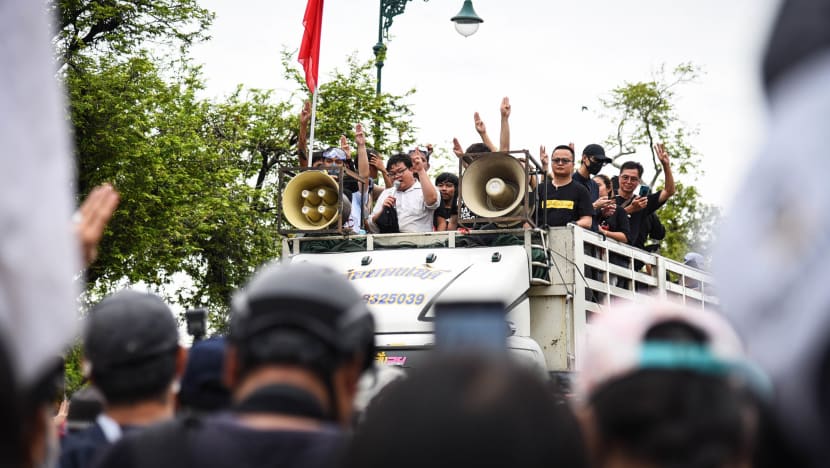
Citing the government’s majority in parliament and support from senators, Prajak said charter amendment would only happen if there is enough public pressure.
“The government will only change their stance when there are a lot of demonstrators to a point where it can shake the government’s stability. If that happens, they may need to step back and compromise.”
In a press conference on Oct 8, civil rights lawyer and activist Arnon Nampa said he expects the protest to last for months. At least 27 youth groups from Thailand’s northeast have expressed their interest to join the demonstration, and so have all the universities in Bangkok, he added.
THE GOVERNMENT’S RESPONSE
The youth movement began in February after the Constitutional Court dissolved the newly formed Future Forward Party and banned its executives from politics for 10 years. Popular among young voters, it was the third largest party after the 2019 election with 81 seats in the 500-seat House of Representatives.
The movement did not take to the streets for several months when Thailand introduced lockdown measures to battle the outbreak of COVID-19. Still, it was active on social media platforms, especially Twitter.
Since July, students from different schools and universities have organised separate activities for various demands, from gender equality to reforms of the educational system and the monarchy.
Several activists have been arrested and charged for their involvement in recent rallies, including Tattep. He was detained in August for a number of charges before being released on bail. One of them is sedition – a crime punishable by up to seven years in prison.
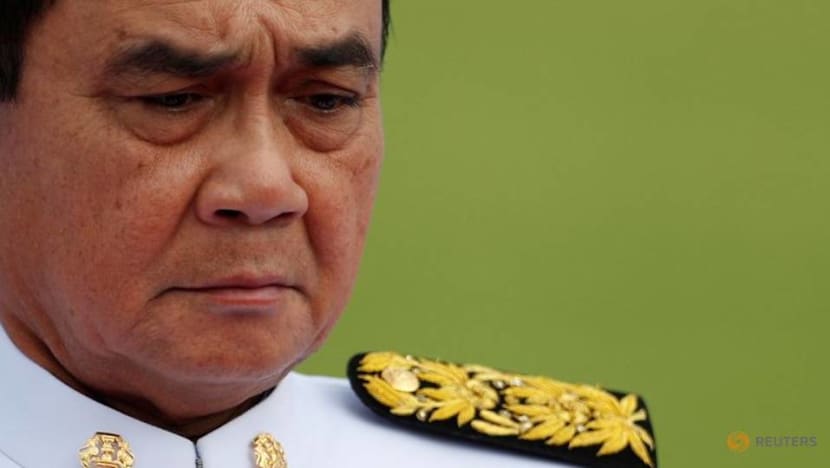
Ahead of the demonstration on Wednesday, Prayut said the activity is allowed as long as it does not violate the law.
“We have to understand that political expression is allowed by the constitution but the most important thing is to respect the law as well,” the prime minister said at the Government House on Oct 5.
“About the big demonstration, I hope it won’t turn violent or intensify. It doesn’t benefit the country at this time, given the situation of COVID-19. In parliament, there are already attempts to achieve many of these demands. So, please consider this too,” Prayut added.
THE MONARCHY
Despite potentially facing legal action, Thai youths have continued to voice their opposition against Prayut’s government, both on the streets and digital platforms. Their movement has attracted many people who oppose Thailand’s traditional political order, the military’s interference in politics and how the current government runs the country.
Recent months saw tens of thousands of people turn up in protests organised by Free Youth and the United Front of Thammasat and Demonstration (UFTD). The rally on Sep 19 at the Sanam Luang public square in Bangkok marked the biggest demonstration the country has seen in six years.
Demonstrators have criticised the monarchy and questioned if the annual budget allocations for the monarchy could be cut. They have also asked if the king’s constitutional powers could be reduced.
This is despite Thailand’s strict lese majeste law – Article 112 of the criminal code. The law punishes whoever defames, insults or threatens the King, the Queen, the Heir-apparent or the Regent with imprisonment of three to 15 years.
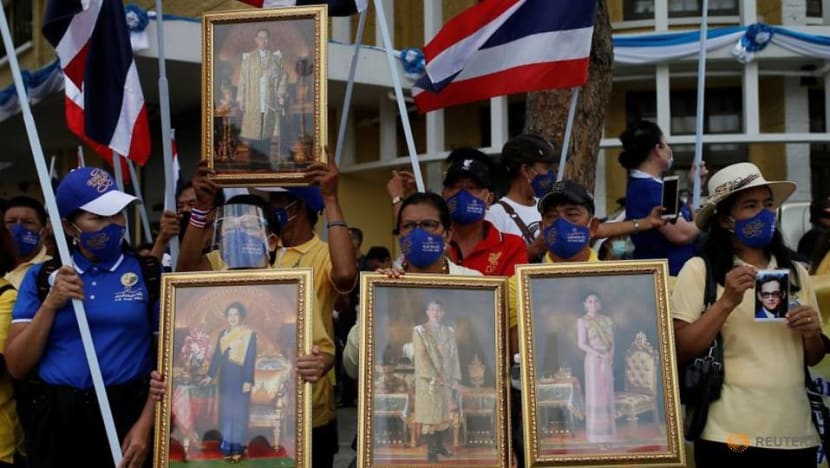
“Everything we’re demanding is democratic; it’s what everyone can do,” said youth activist Jutatip Sirikhan.
“This is not an attempt to overthrow the institution. It’s a demand for reform so that the institution coexists with Thai society gracefully.”
READ: Thai protesters demand monarchy reforms in biggest rally since 2014
COULD HISTORY REPEAT ITSELF?
The political movement of young Thais shares similarities with the uprising of students and pro-democracy supporters 47 years ago. According to Prajak from Thammasat University, Thailand could see history repeat itself if parliament does not approve the proposals for charter amendment when it returns from recess on Nov 1.
“It’s like we’re walking back to the same spot. Students are calling for change to the constitution and the government keeps dodging it despite attempts in parliament to do so,” he told CNA.
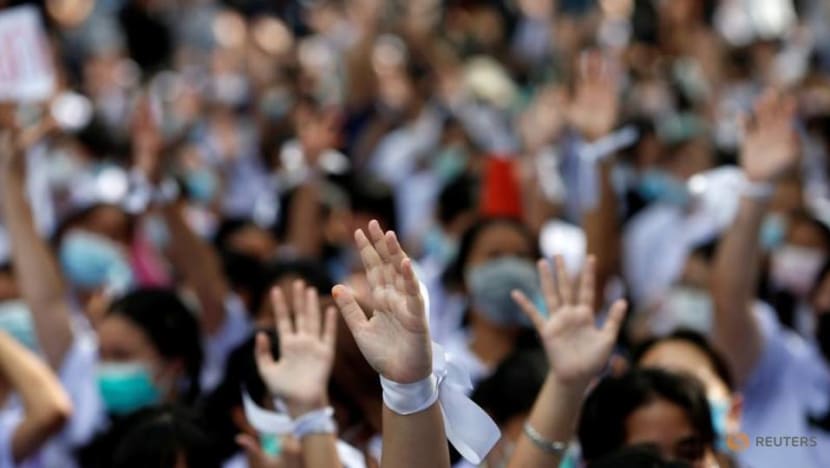
Noting the struggling economy amid the COVID-19 pandemic, the political scientist believes the demonstration on Wednesday could grow to include even more people affected by financial problems.
In August, the Office of the National Economic and Social Development Council revised the expected contraction of the Thai economy in 2020 to between -7.8 per cent and -7.3 per cent. If the government fails to improve the economy, Prajak said this could push more people to take to the streets.
Prajak noted that the demonstration could also be influenced by the economy and unemployment in Thailand. “So it wouldn’t just be a youth movement but that of the people troubled by this government,” he said.














